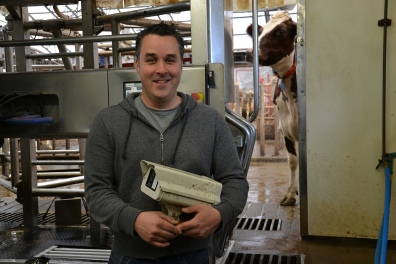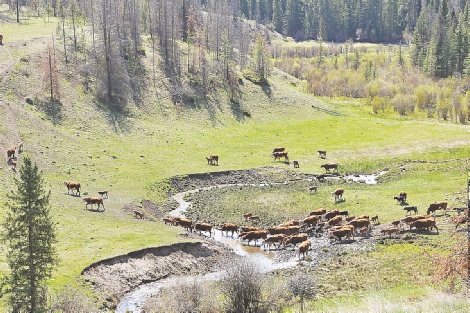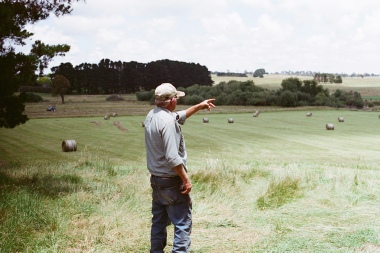Vancouver Island start-up aims to revolutionize mastitis diagnosis
DUNCAN – British Columbia goat farmer and cheesemaker Cory Spencer, his tech-savvy neighbour Damir Wallener and agricultural communications specialist Tamara Leigh have teamed up, formed a company and spent the latter part of 2017 participating in an international business accelerator program in New York City.
The concrete jungle of one of the world’s largest cities is a long way from the pristine vales of Cowichan Valley but the work of Spencer, Wallener and Leigh over the last several months resulted in bringing EIO Diagnostics’ udder health detection system to commercialization. Their product, a diagnostic scanner – either handheld for smaller dairies or mounted for farms with more cows – checks udder health and relays images to a screen where infections can be identified. EIO Diagnostics says its multispectral imaging detects udder health sooner and cheaper than other similar products. The diagnostic system is currently undergoing testing in several commercial cow and goat dairies on Vancouver Island.
The idea for the detection system came about like many agricultural-related inventions. Spencer, who operates The Happy Goat Cheese Company with his wife Kirsten Thorarinson, worked in technology and software development prior to farming. He had a problem with his 100-head goat herd and needed a cost-effective solution – so he created one.
“I had a goat with a particularly aggressive form of mastitis where, by the time I had caught it myself … and treated it, the udder was effectively dead,” he says. “It got me thinking, how can I apply my software background into something I could use myself on the farm. How can we develop a solution that’s much less expensive than what’s commercially available and that I can use?”
He explains that the diagnostics detect the thermal signature of the infection in the udder using computer algorithms which identify the mastitis patterns.
Idea with traction
The idea for commercialization gained traction when Spencer mentioned the idea to Wallener, who lives nearby. Wallener has managed multiple start-up cycles and positive business exits, has experience in product development and has an extensive hardware/software patent history. He says he immediately saw the commercialization potential of the diagnostic scanner and that belief has solidified over the past several months as part of the team to set up EIO Diagnostics.
“When we tell the story to the people that this is going to matter the most to, they get it and they want to get involved,” Wallener says. “From the very first farmer we spoke to, their eyes lit up and they said ‘yes!’ ”
It was Wallener as CEO of the company who led the charge in the business accelerator program in New York, Food-X. The investment company partners with early stage companies across the food supply chain and fast-tracks their growth with access to start-up capital, mentorship, networking, learning and an alumni network.
For EIO Diagnostics, Wallener says Food-X’s immersion into a learning atmosphere with fellow entrepreneurs, innovative thinkers and experienced business people as mentors was exciting and motivating. It also helped keep the company on track towards its initial goals.
“When we started at Food-X, we were literally weeks old. Food-X forced me to think through really carefully on how to get from being a very young company to being a focused company,” Wallener explains, pointing out that with so many possible applications for the diagnostic equipment, the experienced Food-X mentors reminded him to be disciplined at this early stage – polish the current product before expanding. The company did, however, decide to grow the current application beyond goats to include dairy cows and sheep.
Future potential
Looking ahead, Wallener sees growth and expansion for EIO Diagnostics. He says with half a billion dairy animals around the globe, “we want to be the diagnostic tool for each and every one of them.”
EIO Diagnostics is starting with Mexico and is already working to get the diagnostic equipment set up in the barns of some of the country’s largest dairies. The company is also drawn to sub-Saharan Africa, where the United Nations expects a population explosion as the world grows to nine billion people by 2050. Wallener points out that farmers in the region face some of the toughest production challenges in the world. Spencer agrees and says EIO Diagnostics may be able to help.
“There’s a lot potential to help out developing countries that don’t have either the knowledge or the community to detect mastitis or treat mastitis,” Spencer says. The scale of farming is vastly different from developed countries, and therefore the loss of a milk-producing animal has far greater impact.
“The dairies over there are not at the production levels they are here,” he says. “If you lose one animal, you lose production capacity. Here, it’s one out of 100 animals but there, it’s one out of six. That’s a big hit in the income of that particular farmer.”
Those big ideas are exactly what draws SOSV LLC to companies like EIO Diagnostics.
Shawn Broderick, a general partner with SOSV, says the company has US$300 million in assets under management and a staff of 80 who operate accelerators in the areas of hardware, software, biology, food, robotics, medical devices, transportation, green energy and more. Broderick was present during EIO Diagnostic’s three months in New York, working to help bring its idea to reality – and beyond.
“As venture-scale investors, we want to invest in people with big ideas,” Broderick says, looking at the UN’s forecasted population growth.
“How are we going to feed those people? We’re either going to have a radically enhanced food system or we’re going to have a mass starvation and hopefully, we’re not going to the latter. Things like EIO, where they can keep cows healthy, means they get better output,” Broderick states, and increased output means feeding more people.
The distance between the Cowichan Valley, midtown Manhattan and sub-Saharan Africa is vast, but EIO Diagnostics is working to draw the geographic points closer through sound business knowledge and a practical farming diagnostic application.


 Feedback sought on water regs
Feedback sought on water regs